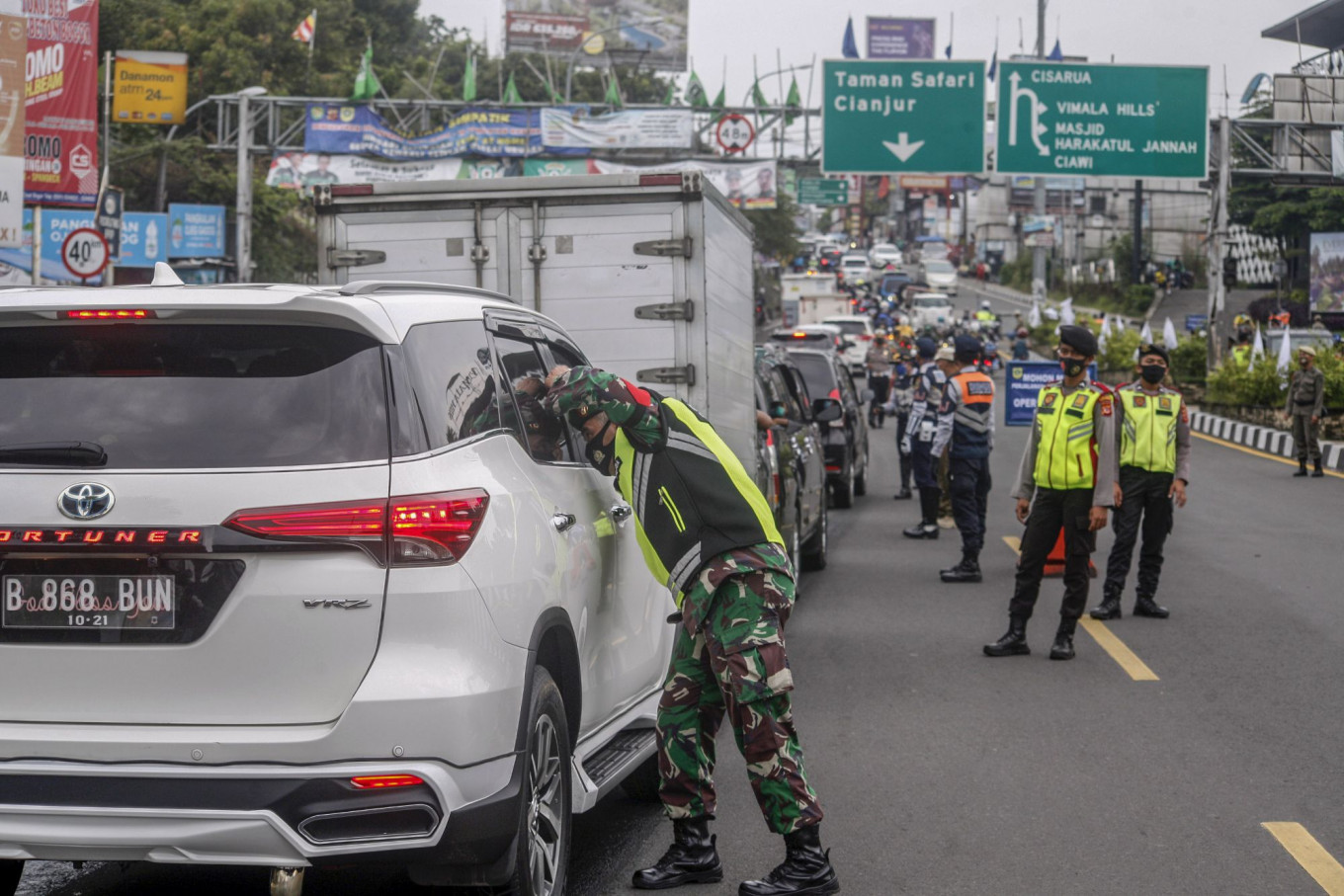Popular Reads
Top Results
Can't find what you're looking for?
View all search resultsPopular Reads
Top Results
Can't find what you're looking for?
View all search resultsPandemic holiday
Domestic consumption generated by long holidays not only helped local economies regain ground, they also helped the nation’s economy grow. Now, as the pandemic has put almost all business to a halt, a long holiday is an opportunity that tourism-related industries are not going to miss.
Change text size
Gift Premium Articles
to Anyone
 An officer of a joint security team checks a car on Jalan Raya Puncak in Gadog, Bogor regency, West Java on Oct. 3, 2020. The Bogor regency administration in cooperation with the National Police and Indonesian Military have set restrictions for visitors in the tourist areas to avoid new COVID-19 clusters following the October’s extended public holiday, which falls from Oct. 28 to Nov. 1. (Antara/Yulius Satria Wijaya)
An officer of a joint security team checks a car on Jalan Raya Puncak in Gadog, Bogor regency, West Java on Oct. 3, 2020. The Bogor regency administration in cooperation with the National Police and Indonesian Military have set restrictions for visitors in the tourist areas to avoid new COVID-19 clusters following the October’s extended public holiday, which falls from Oct. 28 to Nov. 1. (Antara/Yulius Satria Wijaya)
R
eopening the tourism industry as the pandemic rages is like eating the simalakama fruit, an old Indonesian saying that means there are no better choices. Allowing people to flock to tourist destinations during the upcoming long weekend will put them at risk of COVID-19 transmission, but otherwise, tourism-related industries, including restaurants and hotels, would suffer more.
The government has declared a long holiday for civil servants and state employees starting from Wednesday, when the commemoration of the Prophet Muhammad’s birthday begins, until Nov. 1. The policy is not mandatory for the private sector, but it will likely follow suit.
Collective leave days, or cuti bersama, were initiated in 2012 to help the nation’s tourism industry recover from the prolonged impact of the Bali bombings. Back then many countries warned their citizens against traveling to Indonesia for security reasons, forcing the government to encourage domestic tourism to help the industry survive.
The tactic has been in place since and has been proven to work. Domestic consumption generated by long holidays not only helped local economies regain ground, they also helped the nation’s economy grow. Now, as the pandemic has put almost all business to a halt, a long holiday is an opportunity that tourism-related industries are not going to miss.
The last seven months have been exceedingly painful for those industries’ players, many of whom have had to lay off employees for the sake of survival. As of June, the Indonesian Hotel and Restaurant Association (PHRI) reported Rp 85 trillion (US$5.7 billion) in losses as a result of the lack of business. PHRI chairman Hariyadi Sukamdani said 1.5 million workers in tourism-related industries were facing layoffs.
The response to the long holiday has been, understandably, euphoric. State railway operator PT KAI will operate up to 27 extra trains a day on long-distance routes, although each train is subject to a maximum occupancy of 70 percent of capacity in compliance with health protocols. State toll operator PT Jasa Marga is anticipating a surge in traffic and has prepared extra toll gates.
Collective leave days during the pandemic are not without precedent or lessons. The previous two came in the middle and at the end of August. The former coincided with the anniversary of Indonesian independence and the latter with the Islamic New Year.
President Joko “Jokowi” Widodo, reflecting on the August long holidays, has called on the public to follow health protocols strictly during the upcoming holiday. Mass mobility during the previous two long holidays reportedly resulted in a considerable rise in the number of COVID-19 infections.
Jakarta, the epicenter of COVID-19 transmission, reported a record-high 1,114 new COVID-19 cases after the two long weekends.
Many regional governments are taking precautions before welcoming visitors, such as requiring them to present negative COVID-19 test results, reducing the occupancy of tourist destinations to 50 percent of capacity and limiting operational hours.
Nobody wants their leisure time to turn into a disaster for themselves or others. Enjoy the long weekend, and may you return safe and sound.









